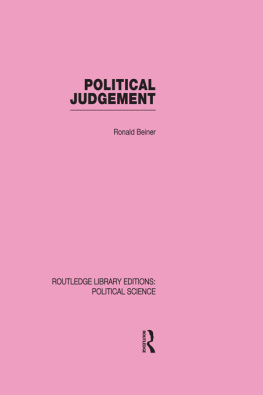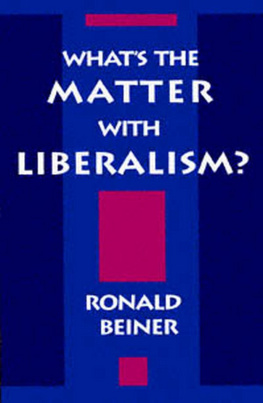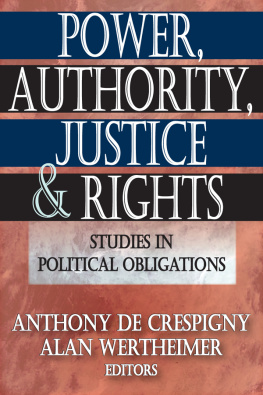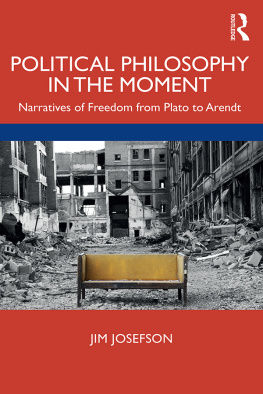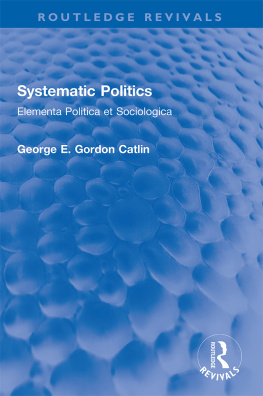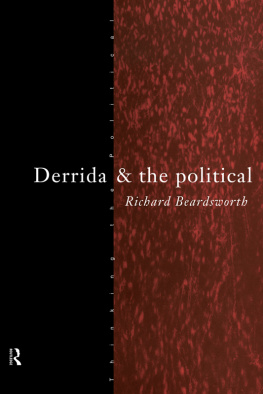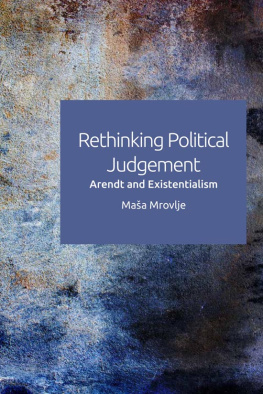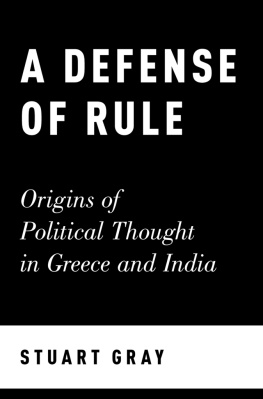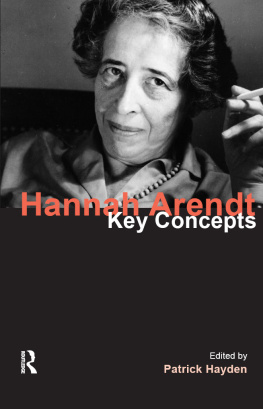ROUTLEDGE LIBRARY EDITIONS POLITICAL SCIENCE
POLITICAL JUDGEMENT
POLITICAL JUDGEMENT
By
RONALD BEINER
Volume 20
First published 1983
This edition first published in 2010
by Routledge
2 Park Square, Milton Park, Abingdon, Oxon, OX14 4RN
Simultaneously published in the USA and Canada
by Routledge
270 Madison Avenue, New York, NY 10016
Routledge is an imprint of the Taylor & Francis Group, an informa business
1983 Ronald Beiner
All rights reserved No part of this book may be reprinted or reproduced or utilised in any form or by any electronic, mechanical, or other means, now known or hereafter invented, including photocopying and recording, or in any information storage or retrieval system, without permission in writing from the publishers.
British Library Cataloguing in Publication Data
A catalogue record for this book is available from the British Library
ISBN 10: 0-415-49111-8 (Set)
ISBN 13: 978-0-415-49111-2 (Set)
ISBN 10: 0-415-55560-4 (Volume 20)
ISBN 13: 978-0-415-55560-9 (Volume 20)
Publishers Note
The publisher has gone to great lengths to ensure the quality of this reprint but points out that some imperfections in the original copies may be apparent.
Disclaimer
The publisher has made every effort to trace copyright holders and would welcome correspondence from those they have been unable to trace.
RONALD BEINER
POLITICAL JUDGMENT
METHUEN LONDON
TO MY PARENTS
First published in 1983 by
Methuen & Co. Ltd
11 New Fetter Lane, London
EC4P 4EE
1983 Ronald Beiner
Printed in Great Britain by the
University Press, Cambridge
All rights reserved. No part of this book may be reprinted or reproduced or utilized in any form or by any electronic, mechanical or other means, now known or hereafter invented, including photocopying and recording, or in any information storage or retrieval system, without permission in writing from the publishers.
British Library Cataloguing in Publication Data
Beiner, Ronald
Political judgment.
1. Political Science
2. Judgment
I. Title
320. 01 JA74
ISBN 0-416-34270-1
ISBN 0-416-34280-9 Pbk
If language is to be a means of communication there must be agreement not only in definitions but also (queer as this may sound) in judgments.
Wittgenstein, Philosophical Investigations,
para. 242
our human experience of the world, for which we rely on our faculty of judgment .
Hans-Georg Gadamer, Truth and Method,
p. 496
Contents
Foreword
The obvious is so often ignored. Basic assumptions are the most difficult to identify and criticize. The familiar is notoriously hard to characterize and simplicity of exposition is far more difficult to achieve than conventional sophistication. I have often thought that any fool can give a seminar or write a monograph but that it takes a very special kind of person to give a first year lecture or to write an introductory book. But Dr Beiner has every right to quote a dictum of Wittgensteins from the Philosophical Investigations: The aspects of things that are most important for us are hidden because of their simplicity and familiarity. One is unable to notice something because it is always before ones eyes.
Political judgment is everywhere. We praise it as a skill or a virtue or we deplore its absence as when people show bad political judgment or, even worse, seek to deny that they are making political judgments at all, perhaps believing that they are merely applying rules (the advocacy of disarmament is an inherently contentious purpose which, therefore, cannot be charitable) or are taking expert advice in some liberal-bureaucratic realm above politics (no single, common examination paper can assess the wide ability levels of all children at 16). Every classic political thinker mentions it, but while some mention it more than others Aristotle, Spinoza, Hobbes, Hume, Burke and Godwin notably yet even they have done so only in passing. The concept is everywhere but it has no literature. Often what is written about seems more to follow scholarly fashion than to stem from any general, thoughtful attempt to appraise what is important, what needs elucidation if we are to understand better the condition we are in and what we may do about it or within it. Most political thinking is now about political thinking. A few years ago, for instance, I was trying to think in a simple-minded way about what were basic or recurring socialist values. Liberty, equality, fraternity seemed an obvious answer or starting point; but it was immediately obvious that while there is a vast literature of books and articles, some speaking to the world but mostly to each other, on liberty and on equality, there were few references to fraternity, though the word is everywhere. I am sure that Dr Beiner would think that I confused the concept of fraternity with that of friendship or mutual trust, which Aristotle regards as prime conditions for citizenship, indeed for political activity at all. Perhaps so, but while both fraternity and friendship occur or are assumed in nearly all major political writings, they have not been examined on their own.
Similarly with political judgment, ubiquitous but undefined. Dr Beiner came to this through an interest in Hannah Arendt, indeed he wrote his Oxford doctoral dissertation on Hannah Arendt and Political Judgment. I had the good fortune to be asked to act as external examiner to the thesis about which I enthusiastically complained that it was really two outstanding theses: one on Arendts political philosophy and the other on political judgment, comparing her treatment of the concept to that of Aristotle, Kant and Gadamer. This book is not a thesis, but it arose from the half on judgment. Rarely have I been more eager to urge that something should be published and read, and read by general intellectuals even more than by students of politics: it challenges them not equally, but more.
Arendts work, however, is central to the argument (work whose importance is at last beginning to be appreciated in this country). Judging was to have been the final section of a trilogy, The Life of the Mind, of which only Thinking and Willing were completed. Only the title page with two epigrams was found in her typewriter at her death. Ronald Beiner has recently edited for the University of Chicago Press her Lectures on Kants Political Philosophy, lectures that professed to find in his Critique of Judgment an implicit theory of political judgment superior to that more obviously found in his Critique of Practical Reason, and he has added a lengthy interpretive essay on Arendts actual fragmentary and probable developed views on judgment. Kant held in his Critique that an aesthetic judgment is inherently social, making reference to a common or shared world, to what appears in public to all who judge; and it neither invokes private whim nor some external, absolute standard. The act of judging implies a commitment to communicate the judgment and to persuade, and this attempt to persuade is not then external to the judgment but is its very raison dtre an activity valuable in itself whether or not the persuasion is successful. Similarly Arendt saw political judgment as a social activity, but (committed to speech, freedom and publicity) valuable in itself, to be praised (becomes the apparent paradox) irrespective of consequences. She wishes, no less, to rescue Aristotle and the classical political tradition from the gloss put upon it by nineteenth-century utilitarianism and encouraged by Kants

